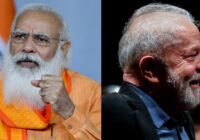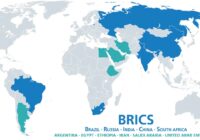The Olympics are now an exorbitant extravaganza for gladiatorial performances that are paid for by people who cannot afford them.
This week, the Olympics began in Rio de Janeiro with a spectacular ceremony as usual. This being Brazil, the games promise to be one hell of a party. The International Olympic Committee (IOC) has prepared well. Apparently, the IOC has distributed 450,000 condoms, thrice the amount it handed out in London. Some 3,000 ladies working in 70 bars are offering a “sex sale” to Olympic athletes to apparently ensure that the condoms will be used.
Apart from condoms, money has flowed into stadiums, security and spectacles. Invariably, much of it has ended up in the hands of corrupt politicians and crooked contractors. Mother Jones estimates that Brazil has spent $20 billion on the Olympics in contrast with a measly $780 million to fight the Zika epidemic. This spending on the Olympics is all the more outrageous given the fact that Brazil is going through a political, economic and social crisis that is tearing the country apart.
In an earlier edition of The World This Week, this author agonized over the bleak future bedeviling Brazil. Already, 19 of the 50 most violent cities in the world are in Brazil. Things promise to get uglier as the economy spirals deeper into recession. In the first quarter, Brazil’s gross domestic product (GDP) shrunk by 5.4%. Unemployment is rising, wages are falling and prices are soaring.
To fund the Olympics, Rio de Janeiro’s governor declared a state of financial emergency. His state relies on oil revenue, which has slumped as prices have collapsed over the last two years. Its deficits are high and its debt ratings low. The political crisis that this author analyzed in May continues like an unending soap opera, exponentially exacerbating Brazil’s economic crisis. The social contact itself is stretched to breaking point with poverty, inequality and crime skyrocketing in 2016.
So grim is the situation that some like José Ricardo Nogueira of Universidade Federal de Pernambuco have argued that Brazil’s social contract itself is an illusion. In an insightful paper, Nogueira examined how the Brazilian state manages to tax heavily without redistributing generously so “that even the poorest 20% of the households are, on average, net contributors to the fiscal system.” Brazil is blessed by the bounties of nature but is blighted by the avarice of its elites who have driven this land of samba into debt, destitution and desperation.
Given the circumstances, most people with a semblance of a conscience and a modicum of consciousness are understandably uneasy about the Rio Olympics. Spending so much money on a sporting spectacle simply does not seem right.
In any case, it turns out that Rio brings into focus a rather unsavory long-term trend. Bent Flyvbjerg, Allison Stewart and Alexander Budzier of the Said Business School at the University of Oxford have found that the Olympics over the past decade have cost $8.9 billion on average. Their report on the cost and cost overrun at the Olympics makes chilling reading. At 156% in real terms, “the Olympics have the highest average cost overrun of any type of megaproject.”
The authors point out that the “cost overrun and associated debt from the Athens 2004 Games weakened the Greek economy and contributed to the country’s deep financial and economic crises.” Both the Beijing and London Olympics cost an arm and a leg. However, China and the United Kingdom are rich countries that can afford rousing carousels.
In 2008, the Middle Kingdom was hell bent to prove that it had arrived as a great modern power. In 2012, the UK peddled both James Bond and Queen Elizabeth II for a purpose. Both are symbols of this rainy island’s cultural hegemony that enables British lads to seduce lissome lovelies from Shanghai to San Francisco and allows the queen to love the Commonwealth that, in the memorable words of its current foreign secretary, “supplies her with regular cheering crowds of flag-waving piccaninnies.”
Needless to say, Greece and Brazil cannot quite afford to act like China and the UK. Poor peasants are generally ill advised to ape the lavish manners of lords who live in castles. Besides, neither Greece nor Brazil has achieved anything by hosting the Olympics except spending money they did not have and bringing ruin upon themselves.
This brings us to a difficult issue. In modern times, what is the role of sports in general and of the Olympics in particular?
To answer that question, we have to acknowledge that humanity is hardwired to play and watch sport. Witnessing Usain Bolt run, Michael Phelps swim or Lionel Messi kick a ball can be sublime. Besides, as the ancient Greeks discovered early on, sports build character, forge teams and give valuable life lessons.
Yet sports have an ugly underbelly too. If winning is everything, defeat is disgrace. None other than Pindar, the legendary Greek author of haunting odes, spoke about the defeated slinking away even from their mothers “sorely wounded by their mischance.” This fixation with victory makes athletes, coaches and staff start believing that the ends justify the means. For prospects of glory and money, many make the Faustian pact with Mephistopheles. Some turn into lying psychopaths like Lance Armstrong. Others lose their way like Ben Johnson.
It is not just athletes who cheat. Many coaches turn rogue. Countries that equate national sporting success with an international projection of power institutionalize cheating. According to the World Anti-Doping Agency, Russia has operated a state-sponsored doping program for four years across the “vast majority” of summer and winter Olympic sports.
Even when countries do not cheat, they end up spending insane amounts on sports. A 2008 paper estimated the size of the American sports industry to be from $44 to $73 billion in 2005. For the last 11 years, this size has kept growing. Many argue that this money is well spent. It creates a healthier society. But that might not be entirely true. Only a few people end up becoming sports professionals and the United States continues to be one of the fattest countries in the world.
Sporting spectacles have warts much uglier than cheating. As pointed out earlier, the Olympics cost a ridiculous sum. Besides, they marginalize the marginalized further. Beijing is still haunted by the ghosts of the hutongs that were bulldozed to make way for a spectacular 2008 Olympics. The flipside of the Beijing extravaganza was best captured in what an old Chinese man said to Annette Langer of Der Spiegel: “The Olympics have dealt a blow to common citizens; they have destroyed our lives.”
Brazil has emulated China dutifully. Jules Boykoff estimates that more than 77,000 people have been forcibly removed from their communities to make way for the Olympics. In a riveting article, Sally Jenkins of The Washington Post points out the irony of IOC members enjoying prime seating and dining on $450 a day while those just 50 yards away live off $228 a month and cannot dream of a ticket to any Olympic event.
Jenkins goes on to write: “The extent to which the Olympic ‘movement’ has become a destructive force, driven by an officialdom whose signature is indifference, can be seen just outside the Olympic Park fences, and I mean just outside.” In the article, she poignantly captures how a multi-generational favela was converted into an Olympic parking lot. Only 20 tiny utilitarian cottages remain for the stubborn families that refused to leave even when their homes were demolished. Delmo de Oliveira lost his home and hauntingly remarks, “The Olympics has nothing to do with our story.”
Amnesty International records how the Olympics have become deadly for people like de Oliveira. Police has been gunning down suspects who tend to be young black men just as in the US. For favela residents and protesters, police violence is a feature of daily life that has got worse in the run up to the Olympics. The police have sprayed them wantonly with pepper spray and rubber bullets. History is repeating itself. Two years ago, when Brazil hosted the 2014 FIFA World Cup, police killings in Rio de Janeiro state shot up by 40%.
In some ways, the Rio Olympics is a metaphor for globalization. Television, YouTube, Facebook et al now make videos of athletes available anywhere anytime on any device. Viewers from Shanghai to San Francisco can gasp at the superhuman performances of modern-day gladiators, products of miraculous sports science if not devious doping. The IOC officials, Brazil’s elites and corporate sponsors laugh all the way to the bank, while already suffering Brazilian taxpayers foot the bill for this modern-day, multibillion-dollar circus. Of course, some Brazilians end up losing their homes and getting shot on top so that the high and mighty can safely watch gladiatorial performances, sip fine Burgundies and savor caviar.
The Olympics and the IOC have always had a dark side. Pierre de Frédy, Baron de Coubertin’s focus on allowing only amateur athletes was upper class humbug. It discriminated against poor colored athletes like the legendary Jim Thorpe. To this day, the IOC has not modified its record and fully reinstated what the Smithsonian calls “the greatest American Olympian of all time” because he played minor-league baseball in 1909-10.
Yet Coubertin was a romantic who idealized both British public schools and ancient Greece. He saw sports as a means to peace. As early as 1911, the fusty aristocrat was bemoaning “the often exaggerated expenses incurred for the most recent Olympiads.” Today, the Olympics have become a monstrosity. Without reform, they will lose their relevance.
Finally, even the sordid Rio Olympics have a silver lining. Refugees have their own time for the first time in Olympic history. The United Nations say that refugee numbers have shot up to 65.3 million today. This figure is greater than after World War II. Many have survived great danger to escape. Yusra Mardini was in a dinghy in the Aegean Sea when the motor failed. Along with her sister and two others, she towed the tiny boat in chilling waters of a dangerous sea where many drown on a regular basis. Mardini has now become the first to represent refugees at the Olympics, an inspirational and heartwarming story.
Like Jesse Owens in 1936 or Tommie Smith and John Carlos in 1968, refugees in Rio might leave an indelible mark on the sands of time. They may not mitigate the war, conflict, persecution and desperation that are driving millions away from their homes, but they have now placed the global refugee crisis firmly in the public eye.
*[You can receive “The World This Week” directly in your inbox by subscribing to our mailing list. Simply visit Fair Observer and enter your email address in the space provided. Meanwhile, please find below five of our finest articles for the week.]
Rio Olympics: Winds of Change or Tides of Turmoil?
Can the Olympic Games help Brazil through its economic problems?
As many sporting fans await the start of the Olympics, it is hardly an understatement that the host country, Brazil, faces a number of economic and political challenges. Some of the many problems include an ailing economy and an uncertain political situation. Other countries have also seen their share of problems leading up to the Olympics, from the Russian team’s doping scandal to Pakistan’s dire state of its sporting facilities. Yet, as Brazil lurches from one crisis to another, it remains to be seen if the Olympics will help the country overcome its problems.
The Economist notes that Brazil enjoyed a period of economic growth of 2.2% year-on-year average from 2011 to 2014. Between 2002 and 2008, the country experienced an average GDP year-on-year growth rate of 3.5%. The article also noted that Brazil’s unemployment rate even dipped below 5% for most of 2014. This was reflected by the National… Read more
Bringing Sustainable Healthcare to Rural India
An independent project is increasing access to healthcare in rural India.
A good quality healthcare system and access to it by the impoverished is a widely-discussed issue, with governments across the world working toward resolving it. India, with its population of approximately 1.2 billion people, is seeing an improvement in public healthcare but, with a population set to be the largest in the world by 2028, there is still much to be done.
A nation with such a large and diverse population faces a multitude of problems, and the government simply does not have the ability to take care of everyone. Sometimes political differences between the center and the states and bureaucratic red tape cause inefficiencies at various levels. This makes the employment of independent organizations without political affiliations essential for the livelihood goals of the nation’s poor and underrepresented citizens.
When Dr. Padmini Balagopal spent six months doing a lifestyle modification training with the villagers of Karakhdi… Read more
Engaging Women to Help Combat Extremism
It is time to include women and marginalized groups in efforts to combat extremism.
In June, President Barack Obama joined over 1,200 promising entrepreneurs and venture capitalists from 78 countries at Stanford University for the annual Global Entrepreneurship Summit (GES) to discuss how entrepreneurship can build resilience to extremism.
Now in its seventh year, the summit works to support the development of new public-private partnerships and innovation ecosystems. At a time in which the media’s eye has been heavily focused on the rise of the Islamic State (IS) and other radical groups, its fresh-faced focus on market growth and innovative technology as a means to combat extremism is a welcome approach.
In his remarks at the summit, US Secretary of State John Kerry highlighted the tie between economic opportunity and peace building. “There is an intimate connection between the creation of economic opportunity and the potential of political stability or peace … between economic policy and foreign policy… Read more
Feeling the Bern in November Can Change the System
Have an entrenched two-party system and an antiquated process of the electoral college skewed the meaning of universal suffrage in America?
Next November Democrats, Republicans and independents will collectively decide which of two undesirable, seriously flawed candidates will be the next president of the United States. None of these three groups is happy with the binary choice that has been offered them. July has seen the Republicans nominate a candidate who many consider not to be a true Republican. This left the Democrats free to finalize their choice of a preselected candidate who, as a pillar of the establishment, happens to appeal to mainstream Republicans.
The insurgent wave of the Democratic Party—led with stunning results throughout the primaries by Bernie Sanders—could paradoxically be better described as the old wave or even the “true Democrats.” Unlike the New Democrats of Bill Clinton in the 1990s, the Sanders insurgents’ policies are modeled on Franklin Roosevelt’s New Deal… Read more
Misguided Tax Targeting Fosters Inequality in Mexico
Mexico has one of the worst tax systems of all industrialized countries.
Juan Armando Hinojosa Cantú, a Mexican construction contractor and business tycoon, is famous in Mexico for his alleged role in building a $7-million mansion for the first lady—best known as the president’s “White House.” But the Panama Papers have quickly made him much more famous, for a much larger sum of money. The Panama Papers, the largest cybersecurity breach in history, uncovered that after the mansion scandal, Hinojosa moved around $100 million to offshore accounts with the help from Mossack Fonseca, the Panamanian-based law firm from which the documents were leaked by an anonymous whistleblower.
As in many other countries, the Panama Papers leak has highlighted or exposed weak tax systems and government accountability in Mexico. The terabyte of information from Mossack Fonseca included 11.5 million documents with diverse mentions of offshore firms and accounts used to hide tax evasion and illicit transactions… Read more
The views expressed in this article are the author’s own and do not necessarily reflect Fair Observer’s editorial policy.
Photo Credit: Microgen
 We bring you perspectives from around the world. Help us to inform and educate. Your donation is tax-deductible. Join over 400 people to become a donor or you could choose to be a sponsor.
We bring you perspectives from around the world. Help us to inform and educate. Your donation is tax-deductible. Join over 400 people to become a donor or you could choose to be a sponsor.
Support Fair Observer
We rely on your support for our independence, diversity and quality.
For more than 10 years, Fair Observer has been free, fair and independent. No billionaire owns us, no advertisers control us. We are a reader-supported nonprofit. Unlike many other publications, we keep our content free for readers regardless of where they live or whether they can afford to pay. We have no paywalls and no ads.
In the post-truth era of fake news, echo chambers and filter bubbles, we publish a plurality of perspectives from around the world. Anyone can publish with us, but everyone goes through a rigorous editorial process. So, you get fact-checked, well-reasoned content instead of noise.
We publish 2,500+ voices from 90+ countries. We also conduct education and training programs
on subjects ranging from digital media and journalism to writing and critical thinking. This
doesn’t come cheap. Servers, editors, trainers and web developers cost
money.
Please consider supporting us on a regular basis as a recurring donor or a
sustaining member.
Will you support FO’s journalism?
We rely on your support for our independence, diversity and quality.











